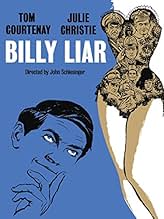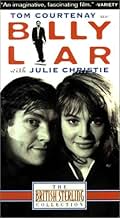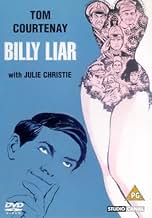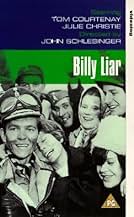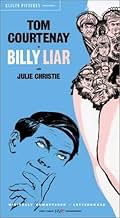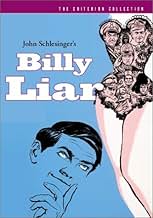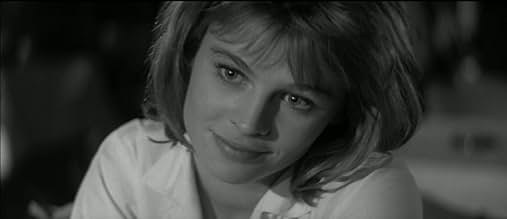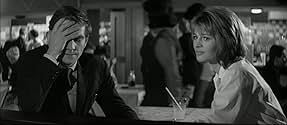IMDb RATING
7.2/10
7.6K
YOUR RATING
A lazy, irresponsible young clerk in provincial Northern England lives in his own fantasy world and makes emotionally immature decisions as he alienates friends and family.A lazy, irresponsible young clerk in provincial Northern England lives in his own fantasy world and makes emotionally immature decisions as he alienates friends and family.A lazy, irresponsible young clerk in provincial Northern England lives in his own fantasy world and makes emotionally immature decisions as he alienates friends and family.
- Director
- Writers
- Stars
- Nominated for 6 BAFTA Awards
- 1 win & 7 nominations total
Jim Brady
- Prisoner Escort
- (uncredited)
Aleksander Browne
- Bit Part
- (uncredited)
James Byron
- Serviceman
- (uncredited)
- Director
- Writers
- All cast & crew
- Production, box office & more at IMDbPro
7.27.5K
1
2
3
4
5
6
7
8
9
10
Featured reviews
nice and recognizable story - actual now and then
I was a teenager when the film was made, and immediately recognized the pictures of cities in the 60's, the cars, streets, buildings, the interior of the houses. Even so the way people looked and talked. Beautiful. I never read the book but it seemed to me that Billies dreams were put on screen a bit overdone but therefore also very funny. Like small boys càn exaggerate, but Billy was not a small boy anymore, and therefore really a sad guy. His family had had it with him, quarrelling all the time, his boss and colleagues saw through him and everywhere his time was running out. That he had 2-3 girlfriends was a miracle. His lying promises did the trick. Time for a change, one would say ! The climax was the end of course. All of a sudden Liz got on his right side with messages of love and persuaded him onto the train to London. She was enthusiastic and dedicated to get with him out of her dull-after-war-life and gloomy city. The message of the movie is: grab your chances now or don't. In the 60's that was a coming up and everyday question for many of the young people (and still is !) and therefore very actual (then and now). I liked the movie and how the actors created their characters. Tom Courtenay did it with very much conviction. A splendid, for that time spirited, and very good looking Julie Christie as Liz the new-age young girl, with no ties or limitations (responsibility ?) whatsoever to withhold her from doing what she wanted to. We saw more of these girls in Holland soon after 1963. See the movie: you won't regret it I'm sure. Hans Veldman.
incandescent performance from Julie Christie
Having seen Albert Finney on stage I didn't feel that Tom Courtney was as strong in the lead role for the film but in many ways this suits the part. No point in making the daydreaming loser too strong in personality, although the anomaly here is that he seems to have no difficulty attracting the ladies even if he is a bit soppy. Never as funny as the book, Schlesinger opens up the film and those facial gestures from the stage and subtle asides in the book are lost. As a movie capturing the times that were very much about to change it is brilliant. I loved the opening credits with the rows of semi-detached houses (because we are talking poor middle class here, not working class) and the shots of slum clearance. The tone is apt too and very theme, so central here, of 'going down to London' so much of the time just a few years before those swing sixties would burst everything apart. One last point, should anyone be wary of bothering with a British 'kitchen sink' drama, there is an early and completely incandescent performance from Julie Christie. She glows on screen and is particularly noticeable with the surrounding drabness and the usual stereotypical British girls on show. A sensational performance that set Christie up fora very decent career and parts in some very influential and important films, not least her next with the same director - Darling.
Maturing like good wine (and no lie!)
Tragi-comic misadventures of a young man who invents a fantasy world as cover for his troubles and dreary middle-class existence in sixties Yorkshire.
Billy Liar was always a terrific film, but like so many of its kitchen-sink contemporaries (Saturday Night and Sunday Morning, A Kind of Loving) it has actually grown in substance and depth since its release. Part of the reason is the extensive use of on-location filming all these movies utilised: a post-war industrial landscape long since lost and therefore all the more vivid in its posterity. But where Billy Liar gets a bigger march on its predecessors - whether by intent or accident - is that it captures this landscape on the cusp of the swinging sixties, when architecture, culture, leisure and morality were all rapidly changing. In doing so it heralds many of the themes and issues that were to dominate western culture for the remainder of the 20th Century: pop culture, advertising, media obsession, celebrity, race relations and fantasy lifestyles.
Billy seemed an endearing but essentially lost soul in his day; an immature weakling unable to face up to the realities and responsibilities of adulthood. But looked at from the hindsight of 40 years he now seems symptomatic of what is today regarded as normal, almost aspirational, behaviour: self-absorption; avoidance of responsibility; glorification of celebrity; escape culture.
Whether director John Schelsinger and writers Keith Waterhouse and Willis Hall foresaw all the cultural and sociological changes they captured is something only they would know (they surely couldn't have seen the significance of casting Julie Christie - one of the ultimate swinging sixties icons). Whatever the case, what makes Billy Liar such a fascinating film is the casual, uncritical and unselfconscious way its many themes are observed. Its lack of preachiness or self-righteousness help keep it a fresh and funny entertainment that can be enjoyed at that level. Its historical importance as a perfect snapshot of a country at a time of rapid and fundamental change is nothing less than priceless.
Billy Liar was always a terrific film, but like so many of its kitchen-sink contemporaries (Saturday Night and Sunday Morning, A Kind of Loving) it has actually grown in substance and depth since its release. Part of the reason is the extensive use of on-location filming all these movies utilised: a post-war industrial landscape long since lost and therefore all the more vivid in its posterity. But where Billy Liar gets a bigger march on its predecessors - whether by intent or accident - is that it captures this landscape on the cusp of the swinging sixties, when architecture, culture, leisure and morality were all rapidly changing. In doing so it heralds many of the themes and issues that were to dominate western culture for the remainder of the 20th Century: pop culture, advertising, media obsession, celebrity, race relations and fantasy lifestyles.
Billy seemed an endearing but essentially lost soul in his day; an immature weakling unable to face up to the realities and responsibilities of adulthood. But looked at from the hindsight of 40 years he now seems symptomatic of what is today regarded as normal, almost aspirational, behaviour: self-absorption; avoidance of responsibility; glorification of celebrity; escape culture.
Whether director John Schelsinger and writers Keith Waterhouse and Willis Hall foresaw all the cultural and sociological changes they captured is something only they would know (they surely couldn't have seen the significance of casting Julie Christie - one of the ultimate swinging sixties icons). Whatever the case, what makes Billy Liar such a fascinating film is the casual, uncritical and unselfconscious way its many themes are observed. Its lack of preachiness or self-righteousness help keep it a fresh and funny entertainment that can be enjoyed at that level. Its historical importance as a perfect snapshot of a country at a time of rapid and fundamental change is nothing less than priceless.
Pants on Fire...
Your trapped inside a home with aging parents (and a grandparent), in a town you'd really rather not frequent, working at the undertaker, you're the epitome of faker, although you have a little world where you're content. Now you've got yourself into a spot of bother, an engagement ring to two is what you've proffered, plus a stash of calendars, because of your malingerers, and the petty cash is short inside its coffers.
Never a dull moment in the life of Billy, as he perpetually puts himself into situations and scenarios that are all his own doing, with wonderful performances all round that still have an impact to this day.
Never a dull moment in the life of Billy, as he perpetually puts himself into situations and scenarios that are all his own doing, with wonderful performances all round that still have an impact to this day.
better than the play
I saw 'Billy Liar' on stage in London, with Albert Finney, no less, in the role of Billy Fisher. As good as Finney was (check out Frear's 'Gumshoe' for starters), in the role, Tom Courtney, is better. Finney was too laconic. He had the wrong
'build'. Courtney, however, IS Billy Fisher. I can't quite put it into words, but that dour face of his, the pursed lips, and his loopy smile... who else but Tom
Courtney in the role. The plot is simplicity itself. Billy lives in a world of his own making. He's not connected with everyday events - he's a Yorkshire version of Walter Mitty - and who doesn't daydream every now and then? Director, John
Schlesinger (who gave us Darling & Midnight Cowboy), adds some surreal
touches (one comes to mind: Billy's reaction to another of his father's lectures). Julie Christie plays Liz. She understands Billy - thing is, Billy doesn't quite understand her, or if he does, it frightens the pants off him. For all Billy's posturing, he's a home boy at heart. "Billy Liar" is one of the truly great British films of the sixties. It's not often it appears on late night T.V., or on cable. If it does, or you see it on video at your local video store, get it out. See it. then wind it back and see it again!!
'build'. Courtney, however, IS Billy Fisher. I can't quite put it into words, but that dour face of his, the pursed lips, and his loopy smile... who else but Tom
Courtney in the role. The plot is simplicity itself. Billy lives in a world of his own making. He's not connected with everyday events - he's a Yorkshire version of Walter Mitty - and who doesn't daydream every now and then? Director, John
Schlesinger (who gave us Darling & Midnight Cowboy), adds some surreal
touches (one comes to mind: Billy's reaction to another of his father's lectures). Julie Christie plays Liz. She understands Billy - thing is, Billy doesn't quite understand her, or if he does, it frightens the pants off him. For all Billy's posturing, he's a home boy at heart. "Billy Liar" is one of the truly great British films of the sixties. It's not often it appears on late night T.V., or on cable. If it does, or you see it on video at your local video store, get it out. See it. then wind it back and see it again!!
Did you know
- TriviaThis movie made a star of Julie Christie, even though she's only in it for a total of twelve minutes.
- GoofsIn the opening title sequence, where a woman places a blanket over a balcony and runs off, an arm can be seen popping up from behind the wall and throwing the blanket off the balcony.
- Quotes
Alice Fisher: If you're in any more trouble, Billy, it's not something you can leave behind you, you know. You put it in your suitcase, and you take it with you.
- ConnectionsFeatured in Film Review: Julie Christie & John Schlesinger (1967)
- SoundtracksTwisterella
Performed by Muriel Day (dubbed by unknown vocalist)
- How long is Billy Liar?Powered by Alexa
Details
- Release date
- Country of origin
- Language
- Also known as
- Lažov Bili
- Filming locations
- 37 Hinchliffe Avenue, Baildon, Shipley, Bradford, West Yorkshire, England, UK(Billy's house, Stradhoughton)
- Production companies
- See more company credits at IMDbPro
Box office
- Budget
- £236,809 (estimated)
- Gross worldwide
- $29,591
- Runtime
- 1h 38m(98 min)
- Color
- Aspect ratio
- 2.35 : 1
Contribute to this page
Suggest an edit or add missing content


